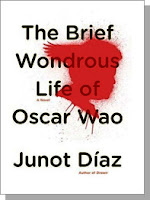The Brief Wondrous Life of Oscar Wao, by Junot Díaz
 I don't know what it is about the Dominican Republic, but between this and Julia Álvarez, it plays very, very well in a novel. It's a character—not so much through its landscape or its topography or even human geography as through its geniality toward myth and hyperbole.
I don't know what it is about the Dominican Republic, but between this and Julia Álvarez, it plays very, very well in a novel. It's a character—not so much through its landscape or its topography or even human geography as through its geniality toward myth and hyperbole.Díaz does the human geography well—he imagines a culture rapturously onto the page—but it is quite clearly in the myth-making that his genius for ramshackle narrative finds its stride and expression. I read one review (I forget where; forgive me, I read too many reviews) which faults Díaz for being too good a compressor of narrative power to make for a full novelist, but, while I haven't read his (legendary) short story collection Drown, I'd say much the opposite was the case. I agree that Wao is ragged, uneven, and that Díaz takes a somewhat unsatisfyingly short time to collate the novel's many pieces into a (somewhat ill-defined) finale. But Díaz is a fantastic novelist precisely because he is able to compress the core elements of the story into vivid bursts, parcelled out somewhat irregularly. It's not smooth reading, perhaps, but neither is The Magic Mountain, and a judgment against this unevenness completely ignores the gargantuan pleasure of reading the thing when it's cooking. Talk to me a week from now and I may find some faults with it, but if you had been there the moment I'd finished, I would have shoved it in your hand and told you it's the greatest novel of the last ten years.
Which is not to say that I won't still hold it in very high regard in a week, or ten, or a year. It's a signal achievement for this year, gutsier and smarter than anything else out there.
And don't be led to believe that an uneven novel can't be also rigorously plotted, as I believe this novel to be. And to complain about unevenness implies that (usually) the slower portions of the book should have been cut; that is most definitely not the case here. The slower bits—mostly those about Oscar's sluggish maturation or about Yunior's women-chasing or, collectively, those set in the US—are actually very strong, well worth their space and time. And mightn't we believe that Díaz is making a point about life in the US compared with life in the DR? Or we could say that Díaz finds himself more restricted by describing American life, and liberated by describing Dominican life—but that would be rather like saying Philip Roth writes boring WASPs—of course he does! Díaz pours all the novel's energy into enlivening the DR, reveling in its magic, and besides, he actually does seem to find American life restrictive compared to Dominican life, so why criticize him for experiencing America as rather pedestrian and narrow? And let's be specific here—Díaz is describing Jersey—who makes Jersey sound exciting? They don't probably because it isn't.
I hope you read Wao, I really do. It's an incredible book, but it's also one that you'll know pretty quickly whether it's for you or not. Read the first few pages in the bookstore and see if you like the style, but do try to track it down.
Comments